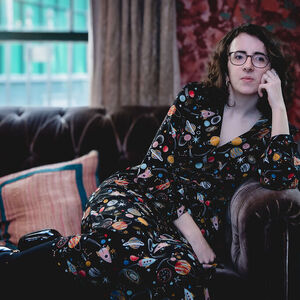You are viewing your 1 free article this month. Login to read more articles.
Publishing the full Spectrum
For a long time, I felt like I had been failed by publishing. After a diagnosis of Aspergers Syndrome - now Autism Spectrum Disorder (or ASD) in 2015 - I set out to learn more about my new ‘label’, and what it meant to me. Recommendations included looking to TV, because characters such as Sheldon Cooper in "The Big Bang Theory" were ostensibly ‘good’ representation. I couldn't relate. Frustrated, I turned to books, expecting someone, somewhere, to have written about my experience. There was very little that was supportive, or even relevant, to me.
It’s good to see that this is changing at long last, although publishing still has a long way to go to plug the gap. Despite Autism Spectrum Disorder being exactly that - a spectrum! - there remains a lack of nuance in books that touch on the varied experiences of people with ASD.
Take the recent backlashes around books about Autism. To Siri With Love - Judith Newman's recent memoir about her Autistic son - may have been met with huge praise, but Autistic individuals shot back. Accusations of eugenics and ableism abounded - Kaelan Rhywiol summarised the objections in a piece for Bustle - as well as a 'Twitterstorm', complete with the hashtag #BoycottToSiri. The author responded that she had not written the book for an Autistic audience.
And this year, my Instagram feed flooded with petitions calling for the removal of I Wish My Kids Had Cancer by Micheal Alan - a book that appeared to equate Autism with cancer. Enough said.
Even less controversial ASD publishing shows up more subtle issues.
A lot of literature overwhelmingly relates to young children, and how they may ‘present’ as being on the spectrum. There is a huge array of what I refer to as ‘medical textbooks’ - where every possible characteristic, personality trait, is dissected, and summed up with “they’re Autistic”. It is dehumanising to become merely the sum of your neurology - and viewed as not being much of a person.
Then there are the memoirs. Up until recently, they have mainly centred around later-in-life diagnoses. (Women are usually diagnosed later in life, for a variety of reasons. Diagnostic criteria is thought to not be nuanced enough to pick us up - and we are masters of ‘masking’ our hallmarks.) Odd Girl Out by Laura James was utterly seismic - but I could not relate to it fully, as she is decades older than me. I was 15 at the time of my diagnosis - and it felt like no one really understood, though there were shared themes in the book I resonated with.
There are also a lot of books about parenting - but they are written by parents not on the spectrum. Spectrum Women: Autism & Parenting is out next month - and, so far, has been seen as a ‘revelation’. Why? Because it is written by people on the Autistic spectrum! As the saying goes, ‘nothing about us, without us’ - and this should apply to books about parenting Autistic children. It’s good to have books that are almost like textbooks - but they are not necessarily the real, lived experience of being on the spectrum. They miss the colour, the humanity. And that, I think, could often be said when someone not on the spectrum writes about being Autistic.
When publishing does not cover the ‘full spectrum’ of what it means to be Autistic, it leaves people like me feeling isolated. It’s heartening to see the small steps to this changing - because the community I am part of, by proxy and thanks to my label, will feel less alone - as well as more accepted and acknowledged.
Stim: An Autistic Anthology was released earlier this year. Edited by Lizzie Huxley-Jones, this book was notable for giving free rein to the Autistic contributors. Essays, art, even fiction - not necessarily about Autism! - made this book a stand-out tome in its niche. It’s refreshing to read, offering a range of non-neurotypical perspectives.
Illustrator Megan Rhiannon has also released Existing Autistic - a self-published, illustrated book that contains information about functioning labels, sensory overload, and more. It has been received with thunderous applause - with her needing to re-stock it at least once since the release.
Jessica Kingsley Publishers has become a leading publisher in the field. A lot of Autistic women I know wanted something like a guide book when they were teenagers - and Siena Castellon has written it. At seventeen, she has written The Spectrum Girl’s Survival Guide - the book I would have loved when I was diagnosed, as it feels like a reassuring hug, suggesting that everything will be okay. Other topics the publisher tackles includes PDA, being Transgender and on the spectrum, parenting when Autistic or parenting Autistic children - and so much more.
If you cover more of the spectrum - where there are gaps to be filled - you leave people like me feeling less isolated, as well as more understood. This could also be an educative tool - so that there is less discrimination, less prejudice. Publishing may have failed the community I am a part of - but at long last, it is changing. And it is so good to see.
Lydia Wilkins is a journalist with bylines in the Independent, Readers Digest, Refinery 29 and others. She also writes a weekly newsletter for other individuals, like her, who are on the Autistic spectrum.















